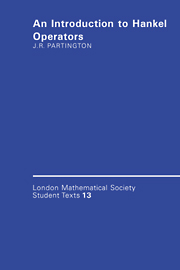2 - Hardy Spaces
Published online by Cambridge University Press: 25 January 2010
Summary
As will be seen in Chapter 3, the most fruitful way of looking at Hankel operators is to consider them as acting on certain spaces of analytic functions, namely the Hardy spaces. The classic Hardy spaces (Hp spaces) consist of analytic functions defined on the open unit disc that exhibit suitable behaviour as one approaches the boundary. The discussion is simplest for H2, which is naturally regarded as a closed subspace of L2(T), T being the unit circle, and thus a Hilbert space in its own right. Similarly the other Hp spaces embed in the corresponding Lp spaces. After treating H2, we consider H∞ and H1 in detail, H∞ by relatively elementary arguments, H1 by more complicated reasoning. This involves us in a discussion of Blaschke products, the Poisson kernel and, ultimately, the Riesz factorization theorem.
It is possible to define Hardy spaces on other domains than the disc; the right half plane C+ is important for our purposes. An important fact here is that Lp(iR) can be related to Lp(T) using a Möbius map. The spaces Hp(C+) are defined and related to the Hardy spaces on the disc in the same manner. In addition, it turns out that the Laplace transform, often regarded merely as a trick for solving differential equations, plays a precise role as an isomorphism between H2(C+) and the Lebesgue space L2(0, ∞). We therefore discuss this in detail.
The theorems of this chapter are again standard, though we have given a more elementary treatment than is customary (avoiding the use of harmonic functions almost entirely and dispensing with maximal functions).
- Type
- Chapter
- Information
- An Introduction to Hankel Operators , pp. 13 - 28Publisher: Cambridge University PressPrint publication year: 1989



